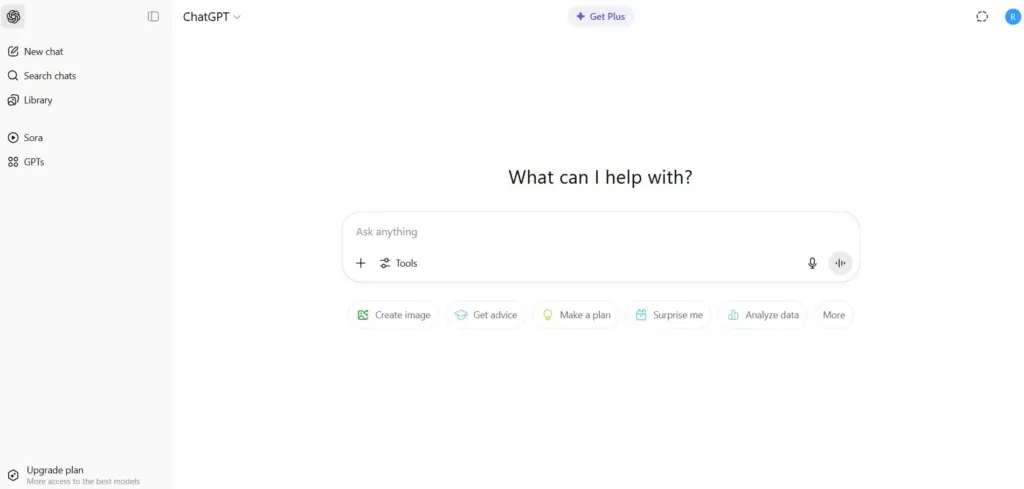If you’ve ever tried to boost your website’s visibility online, you already know the importance of keyword research. Keywords are the backbone of SEO, helping search engines understand your content and connect it with users who are searching for information. But traditional keyword research can be time-consuming and sometimes expensive.
That’s where ChatGPT steps in.
With the right prompts, ChatGPT can help you brainstorm keyword ideas, analyze intent, generate long-tail variations, and much more in just a few minutes.
In this blog, we’ll dive into how to use ChatGPT for keyword research, sharing some prompts and guiding you step-by-step through the process. Whether you're a beginner or an experienced SEO, this guide will make keyword research easier, faster, and smarter.
Also read: What is ChatGPT? A Beginners Guide
Why Use ChatGPT for SEO Keyword Research?
Traditional keyword tools like Ahrefs, SEMrush, and Google Keyword Planner are powerful but often come with limitations such as:
- Expensive subscription fees
- Limited access to real-time trends
- A learning curve for beginners
- Too much data and not enough direction
ChatGPT, when prompted effectively, can overcome these hurdles. It acts like a creative assistant that helps you:
- Generate seed keyword ideas
- Create long-tail keyword variants
- Understand search intent
- Identify content gaps
- Group keywords by topic or category
- It’s fast, cost-effective, and accessible 24/7
How to Do Keyword Research Using ChatGPT (With Prompts)

Let’s walk through the ChatGPT keyword research process in simple, actionable steps.
Step 1: Define Your Niche or Topic
Before prompting ChatGPT, clarify what your website or content is about. Ask yourself:
- What problem does my audience want to solve?
- What product or service am I promoting?
- What is the main theme of my content?
Prompt Example:
"I run a blog about vegan recipes. Can you give me keyword ideas people might search related to vegan cooking or vegan diets?"
Step 2: Generate Seed Keywords
Start by asking ChatGPT to list broad keyword ideas, also known as seed keywords. These are general phrases related to your niche and form the foundation for more detailed research.
Prompt Example:
"Give me 15 seed keywords for a blog focused on digital marketing."
Response might include:
- digital marketing strategies
- SEO tips
- social media advertising
- content marketing
- email marketing
Recommended Professional Certificates
Digital Marketing Mentorship Program
Advanced AI Marketing Bootcamp
Performance Marketing Bootcamp
SEO Specialist Bootcamp
Step 3: Expand to Long-Tail Keywords
Long-tail keywords are specific search phrases that often bring in targeted traffic with lower competition. ChatGPT can help you generate them in seconds.
Prompt Example:
"Generate 20 long-tail keyword ideas for the seed keyword ‘email marketing’."
Examples:
- best email marketing tools for small businesses
- how to write engaging email subject lines
- email marketing tips for beginners
Step 4: Understand Keyword Intent
Understanding why a user is searching (informational, navigational, transactional, or commercial) is key to creating content that matches their needs.
Prompt Example:
"For the keyword 'best running shoes for women', what is the search intent?"
ChatGPT might respond:
The search intent is commercial. The user is likely comparing products and is close to making a purchase decision.
Also read: How to Use ChatGPT? The Ultimate Guide
Step 5: Group Keywords by Topic
Grouping keywords helps you plan content clusters, which can improve your site structure and internal linking.
Prompt Example:
"Group the following keywords into topic clusters: SEO tools, best free SEO tools, keyword research tools, technical SEO guide, on-page SEO techniques."
ChatGPT might group them as:
Tools: SEO tools, best free SEO tools, keyword research tools
Guides & Techniques: technical SEO guide, on-page SEO techniques
Step 6: Identify Content Gaps
ChatGPT can help you find keyword opportunities that your competitors might be missing.
Prompt Example:
"What are some content gaps in the SEO niche that are not commonly covered?"
You might get ideas like:
- How to do SEO for voice search
- SEO strategies for TikTok or YouTube Shorts
- Common myths about E-E-A-T (Experience, Expertise, Authoritativeness, Trustworthiness)

ChatGPT Prompts for SEO Keyword Research
Here’s a list of categorized, ready-to-use prompts for all your keyword research needs:
Seed Keyword Generation
1. “List 20 broad keywords related to [your topic].”
2. “What are some trending keywords in [industry] right now?”
3. “Give me keywords people search when they are just getting started with [topic].”
New Keyword Ideas from a Seed Word
Seed words are basic keywords or themes that you can expand into dozens of variations with the help of ChatGPT.
4. “Generate fresh keyword ideas based on the seed word '[insert keyword]’.”
5. “Give me niche-specific keyword ideas using the seed keyword '[topic]’.”
6. “What are trending keywords based on the term '[keyword]’?”
LSI (Latent Semantic Indexing) Terms
LSI keywords are semantically related terms that help search engines understand the context of your content. Using them can boost relevance and improve your page’s chances of ranking higher.
7. “Give me a list of LSI keywords related to '[primary keyword]'."
8. “What are semantically related terms to '[topic]' that I can include in a blog post?”
9. “Generate LSI keywords for the topic ‘plant-based diet’ to improve content relevancy.”
No Masterclass found!
Long-Tail Keyword Expansion
10. “Create long-tail variations for the keyword '[insert keyword]'."
11. “Generate question-based long-tail keywords for '[keyword]'."
12. “List long-tail keywords that include the phrase '[keyword]' and target buying intent.”
Keyword Ideas Based on Audience
11. “What keywords would a beginner search when trying to learn about [topic]?”
12. “Suggest keywords that a professional or expert might use when searching for [topic].”
13. “Give me keywords that a small business owner might search related to [topic].”
Search Intent Classification
14. “What is the likely search intent behind the keyword '[keyword]'?”
15. “Classify these keywords into informational, transactional, or commercial intent: [list of keywords].”
Content Ideation from Keywords
16. “What kind of blog posts can I write targeting the keyword '[keyword]'?”
17. “Suggest article titles based on the keyword '[keyword]'."
18. “Create a blog outline for a post targeting '[keyword]' with high informational value.”
Also read: 80+ Instagram Prompt Ideas (Reels, Captions, Posts & More)
Keyword Clustering
19. “Group these keywords into content categories: [list keywords].”
20. “Which of these keywords can be grouped under a pillar page? [list]”
Explore Key SEO Topics That You Should Know
Competitor-Based Prompts
21. “List keywords that are often used by top-ranking blogs in the [niche] niche.”
22. “What keywords do my competitors use on their homepage if they offer [product/service]?”
23. “Give me keyword gaps based on this competitor's blog: [insert domain]” (for this one, pair it with browser-based tools or keyword tools, then use ChatGPT to analyze).
Keywords Based on Search Intent
Identifying the why behind a search helps you match your content with what the user wants, whether they’re learning, buying, comparing, or navigating.
24. “Give me informational keywords related to '[topic]’.”
25. “List transactional keywords for someone interested in '[product/service]’.”
26. “Break down the following keywords by search intent: [insert keyword list].”
27. “Generate keyword suggestions for the commercial intent stage of the funnel about '[topic]’.”
Example Output for “SEO tools”:
Informational: how SEO tools work, what is an SEO audit tool
Transactional: buy SEO audit software, best SEO tools for agencies
Commercial: Ahrefs vs SEMrush, top-rated SEO tools 2026
Tips to Get the Best Results from ChatGPT
Using ChatGPT for keyword research can prove to be a game-changer, but here are a few tips to get the most accurate and helpful results:
- Be specific in your prompts. The more context you give, the better the output.
- Use follow-up prompts. You can refine results by asking follow-ups like “Can you make it more niche-specific?” or “Add buyer intent.”
- Combine with SEO tools. Use ChatGPT to brainstorm ideas, then validate search volume, difficulty, and competition using tools like Google Keyword Planner, Ubersuggest, or Ahrefs.
- Ask for formatting. Want results in a table format or CSV-ready list? Just ask.
Tools You Can Use Alongside ChatGPT for Keyword Research
While ChatGPT is powerful, combining it with traditional tools can supercharge your research. Here are a few options:
Google Trends- Validate trending keywords
AnswerThePublic- Find question-based searches
Ubersuggest- Check volume and difficulty
Keywords Everywhere- Chrome plugin for keyword metrics
Surfer SEO or Frase.io- Optimize content with keyword suggestions

FAQs About ChatGPT for Keyword Research
ChatGPT is amazing for brainstorming, clustering, and idea generation, but you should still use keyword tools to check actual search volume and difficulty.
ChatGPT doesn’t pull real-time data like search volume. It’s best used for strategy and ideation, not exact numbers.
Make sure to tweak your prompt to include a location.
Example: “Give me keyword ideas for a bakery in New Delhi.”
Tools, such as Google Keyword Planner, Ahrefs, or SEMrush can be used to validate search volume and competition.
Once you have your keywords, ask ChatGPT to create SEO titles, meta descriptions, blog outlines, and more.
Final Thoughts
Keyword research is one of the most important parts of building a successful SEO strategy, and now, it doesn’t have to be overwhelming. With ChatGPT, you can save time, spark creativity, and build a smarter keyword plan that aligns with your content goals.
By using the right prompts and pairing ChatGPT with traditional SEO tools, you can unlock powerful insights and dominate your niche with data-driven content.
Explore Our Free Courses





Leave a comment
Your email address will not be published. Required fields are marked *Comments (0)
No comments yet.